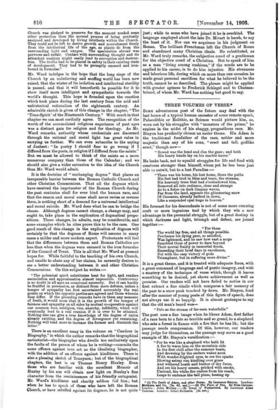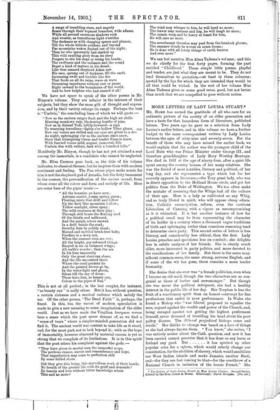THREE VOLUMES OF VERSE.*
SOME adventurous poet of the future may deal with the last hours of a typical human ancestor of some remote epoch,
Palaeolithic or Eolithic, as Science would picture him, as, worn out by his struggles with " monsters of the prime," he expires in the midst of his shaggy, prognathous race. Mr.
Binyon has prudently chosen an easier theme. His Adam is the traditional forefather of the race, nobler and more majestic than any of his sons, "erect and tall, godlike erect," though now-
" Bowed was the head and dim the gaze ; and both His heavy hands lay on his marble knees."
He looks back, not to squalid struggles for life and food with creatures stronger than himself, whom yet he has been just able to outwit, but to a lost Paradise :—
" There was his home, his lost home, there the paths His feet had trod in bliss and tears, the streams, His heavenly trees that had o'ershadowed him, Removed all into radiance, clear and strange As to a fisher on dark Caspian waves,
Far from the land, appears the glimmering snow Of Caucasus, already bathed in dawn,
Like a suspended opal huge in heaven."
His forecast for his descendants is not of some more cunning craft or more ingenious tool by which they win a new advantage in the perennial struggle, but of a great destiny in which darkness and light, triumph and defeat, are joined together :—
"For them The world lay free, and all things possible. Perchance his dying gaze, so satisfied, Was lightened, and he saw how vast a scope Ennobled them of power to dare beyond Their mortal frailty in immortal deeds, Exceeding their brief days in excellence, Not with the easy victory of gods
Triumphant, but in suffering more divine."
It is a great theme, and it is treated with adequate force, with a great command of language and of poetic imagery, and with a mastery of the technique of verse which, though it leaves something to be desired, yet shows achievement as well as promise. Our readers will not have failed to notice in our first extract a fine simile which compares a fair memory of the past to a snow peak touched by dawn. Mr. Binyon, fond after the manner of young poets of this figure of speech, does not always use it so happily. It is almost grotesque to say that the old man's beard was-
" Pale as the stream of far-seen waterfalls."
The poet uses a fine image when he likens Adam, first father of a race born to a fate so terrible and so grand, to a shepherd who sets a forest in flames with a fire that he has lit ; but the passage needs compression. Of this, however, our readers may judge for themselves, as the passage may serve as a good example of Mr. Binyon's versification :—
" For he was like a shepherd who hath lit A fire to warm him on the mountain side In the first chill after the summer heats, And drowsing by the embers wakes anon With wonder-frighted eyes, to see the sparks Blowing astray run kindling over grass And withered heath and bushes of dry furze, And ere his heavy senses, pricked with smoke, Uncloud, the white fire rushes from his reach, Leaps to embrace the tall pines, tossing up • (1) The Death of Adam, and other Poems. By Laurence Binyon. London: Methuen and Co. [3a. 6d. net.]—(3) The Pipes of Pan. By Bliss Carman. London John Murray.—(3) Songs of Womanhood. By Laurence Alma ',radon& London Grant Richards, [3a. net.] A surge of trembling stars, and eagerly
Roars through their topmost branches, wide aflame, While all around enormous shadows rock And wrestle, as tumultuous light o'errides The darkness as with charging spears and plumes, Till the whole hillside reddens, and beyond Far mountains waken flushed out of the night : Then he who ignorantly had started up This wild exulting glory from its sleep Forgets to stir his steps or wring his hands; The swiftness and the radiance and the sound Beget a kind of rapture in his dread; Like that amazed shepherd Adam saw His race, sprung out of darkness, fill the earth Increasing swift and terrible like fire That feeds on all its ruins, wave on wave Streaming impetuous without rest or pause Right onward to the boundaries of the world: And he how helpless who had caused it all !
We have not space to speak of the other poems in Mr. Binyon's volume. They are inferior in the interest of their subjects, but they show the same gift of thought and expres- sion, and by their variety enlarge its range. Perhaps the best is "Umbria," the concluding lines of which we will quote:— "Now as the eastern ranges flush and the high air chills Blurring meadowy vale, blackening heaths of pine, Now as in distant Todi, loftily-towered—a sign To wearying travellers—lights o'er hollow Tiber gleam, am, Now our voices are stilled and our eyes are given to a dre As night, upbringing o'er us the ancient stars anew, Stars that triumphing CEssar and tender Francis knew, With fancied voices mild, august, immortal, fills Umbria dim with valleys, dark with a hundred hills."
Manifestly Mr. Binyon, though he has not yet attained a seat among the immortals, is a candidate who cannot be neglected.
Mr. Bliss Carman goes back, as the title of his volume indicates, to classical themes ; but he inspires them with modern sentiment and feeling. The Pan whose pipes make music for him is not the shepherd-god of Arcadia, but the deity immanent in the cosmos, the personification of the anima mundi, from whom come all the colour and form and melody of life. Here
are some bars of the pipes' music:- " All the beauties ye have seen : Autumn scarlet, young spring green ;
Floating mists that drift and follow
Up the dark blue mountain hollow ; Yellow sunlight, silver spray ; The wild creatures at their play ; Through still hours the floating seed Of the thistle and milkweed, And the purple asters snowed In a drift beside the road; Swarthy fern by pebbly shoal; Mossed and mottled beech-tree bole; Fireflies in a dewy net,
When the summer eves are wet ;
All the bright, gay-coloured things Buoyed in air on balanced wings ; All earth's wonder; then the sea In his lone immensity Only the great stars can share, And the life uncounted there Where the coral gardens lie And the painted droves go by, In the water-light and gloom, Silent till the day of doom : These have lent, as beauty can,
Colour to the pipes of Pan."
This is not at all perfect ; in the last couplet, for instance, -"as beauty can " is sadly otiose. But it has, without question, a certain richness and a musical cadence which satisfy the ear. Of the other poems, "The Dead Faith " is, perhaps, the finest. In this, too, the unrest of modern speculation is made to give a new meaning to some imagination of the elder world. Just as we have made the Virgilian lacrymae rerun bear a sense which the poet never dreamt of, so we find a "sense of tears " where a simpler-minded generation did not find it.. The ancient world was content to take life as it stood, and, for the most part, not to look beyond it; with us the hope of immortality, however obscured by material causes, is yet so strong that we complain of its limitations. It is in this spirit .that the poet utters his complaint against the gods :— " They have given to mortal man the immortal scope, The perilous chance, unrest and remembrance and hope, That imperfection may come to perfection still
By some fabled shore.
Did they give this being, this marvellous work of their hands, No breath of the greater life with its grief and demands ? Do beauty and love without bitter knowledge attain This and no more? The wind may whisper to him, he will heed no more; The leaves may murmur and lisp, he will laugh no more; The oreads weep and be heavy at heart for him, He will care no more.
The reverberant thrushes may peal from the hemlock glooms, The summer clouds be woven on azure looms ; He is done with all lovely things of earth forever And ever more."
We can but mention Miss Alma Tadema's volume ; and this we do chiefly for the first forty pages, forming the part entitled " Childhood." These simple little poems, playful and tender, are just what they are meant to be. They do not
lend themselves to quotation,—at least in these columns ; quoted by the lips for which they are intended they would be all that could be wished. In the rest of her volume Miss Alma Tadema gives us some good verse, good, but not better than much that we are compelled to pass without notice.















































 Previous page
Previous page